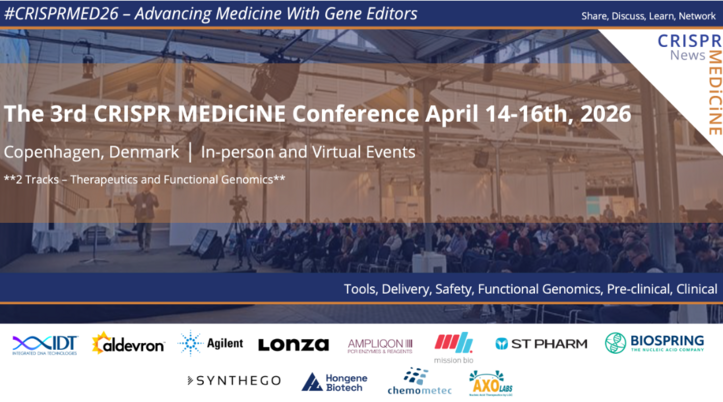CRISPR Clinical Trial Update – Beta Thalassemia
This week’s clinical update looks at two paediatric clinical trials for beta thalassemia using CRISPR-Cas9-edited donor-derived haematopoeitic stem cells (HSCs). Both trials are sponsored by Bioray Laboratories, a Shanghai-headquartered company specialised in gene and cell-based therapies.
Beta thalassemia, HBB mutations and foetal haemoglobin
Beta thalassemia belongs to a group of diseases known as the thalassemias, which are characterised by haemoglobin deficiency. The thalassemias are part of a larger family of autosomal-recessive disorders known as the haemoglobinopathies that implicate haemoglobin.
Beta thalassemia is the most common thalassemia and it may arise from >200 known mutations in the haemoglobin subunit beta (HBB) gene. Mutations in HBB result in a shortage of mature and functional adult haemoglobin, leading to a spectrum of symptoms ranging from none at all to severe anaemia, depending on the exact HBB mutation(s) present.
Beta thalassemia major, also known as Cooley’s anaemia, is the most severe form of the disease, which occurs when there are mutations in both copies of the HBB gene. At present, the only cure for thalassemia is a high-risk bone-marrow transplant, but for most affected individuals the chances of finding a suitable donor are extremely low. Treatment is life-long and includes symptom management, pain relief and blood transfusions.
Foetal haemoglobin (HbF) is highly expressed and critical during foetal development, and is then rapidly suppressed early in life. Reactivation of HbF expression has emerged as an attractive strategy to treat the symptoms of beta thalassemia and related haemoglobinopathies by compensating for the lack of functional adult haemoglobin, and this strategy is used in one of the trials presented in this update.
A trial for foetal haemoglobin-reactivated autologous haematopoietic stem cells
The first trial is a non-randomised, open label, single-site, single-dose, phase 1/2 study in up to 12 child participants (5-15 years) with beta thalassemia major. The study will take place in partnership with the Xiangya Hospital of Central South University, China. The overall study aim is to evaluate the safety and efficacy of a single dose of autologous haematopoietic stem cells that are edited with CRISPR-Cas9 to reactivate foetal haemoglobin (HbF) expression (see Fact Box).
The HBG1 gene in donor-derived HSCs will be edited by CRISPR-Cas9 gene-editing cargo delivered via electroporation. The exact CRISPR editing strategy for this programme has not been disclosed.
The first participant was dosed in April 2020, and the estimated primary completion date for the study, which is still recruiting, is May 2021.
Primary outcome measures include survival of engrafted cells and incidence of adverse events for up to 6 months post-treatment and secondary measures include evaluation of the efficacy of the treatment. Efficacy will be measured by transfusion independence at 6- and 12-month intervals post-treatment, proportion of red blood cells with edited allele in bone marrow and changes in total haemoglobin concentration.
Participants in this study enroll will also be asked to take part in a subsequent long-term follow up study to monitor the safety and efficacy of the treatment for up to 15 years.
Clinical studies for CRISPR-based treatments for haemoglobinopathies are promising
CRISPR-based approaches to reactivating HbF expression have gained a lot of attention in recent years. One approach to activating HbF is to disrupt the B-cell lymphoma/leukaemia 11A gene (BCL11A). BCL11A is a negative regulator of HbF expression, repressing HbF by binding to specific motifs in the promoters of the gamma globin genes HBG1 and HBG2, which encode the building blocks for HbF. Another approach is to disrupt the BCL11A-binding motifs in HBG1 and HGB2. If BCL11A cannot bind these targets, it cannot repress their expression leading to reactivation of HbF production.
Clinical data on CRISPR-mediated reactivation of HbF for the treatment of beta thalassemia and the related sickle cell diseases has raised hopes for the first curative therapy for the haemoglobinopathies. CRISPR Therapeutics’ CTX001, the frontrunner in this field, is designed to reactive HbF expression through a small CRISPR-mediated deactivating deletion within the BCL11A gene of patient-derived HSPCs. You can read our coverage on CTX001 here.
A trial for beta globin-restored autologous haematopoietic stem cells
The second trial is a phase 1/2 single-center, single-arm, open-label study to determine the safety and efficacy of β-globin restored autologous haematopoietic stem cells in beta thalassemia major patients with IVS-654 phenotype. The IVS-654 phenotype refers to a C→T substitution within the second intron of the HBB gene that was previously found to be one of the most common beta thalassaemia alleles affected in Chinese populations.
Donor-derived haematopoietic stem cells will be edited using CRISPR-Cas9 technology to restore β-globin expression. The exact gene-editing strategy has not been disclosed as of yet.
This study, which has not yet started, will take place in collaboration with PLA 923 Hospital in China and aims to enroll up to 12 child participants (5 to 15 years). The estimated primary completion date is 1st December 2022. Each participant will accept one dose of edited HSCs throughout the year-long study and primary and secondary outcome meaures are similar to the first study described in this update.
Subjects who enroll in either study will also be asked to participate in a subsequent long-term follow up study that will monitor the safety and efficacy of the treatment for up to 15 years post-transplant.
For a complete overview of current gene editing clinical trials, check out CRISPR Medicine News' Clinical Trials Database.
Tags
ArticleNewsin vivoBeta ThalassemiaRare DiseaseChinese PLA 923 HospitalXiangya Hospital of Central South UniversityCRISPR-CasCas9Shanghai Bangyao Biotechnology Co., Ltd. - BioRay LaboratoriesTrialsClinical
CLINICAL TRIALS
Sponsors:
Suzhou Maximum Bio-tech Co., Ltd.
Sponsors:
Zhejiang University







